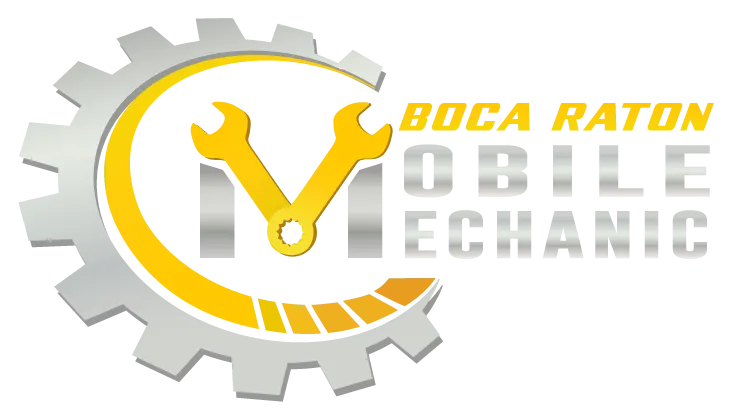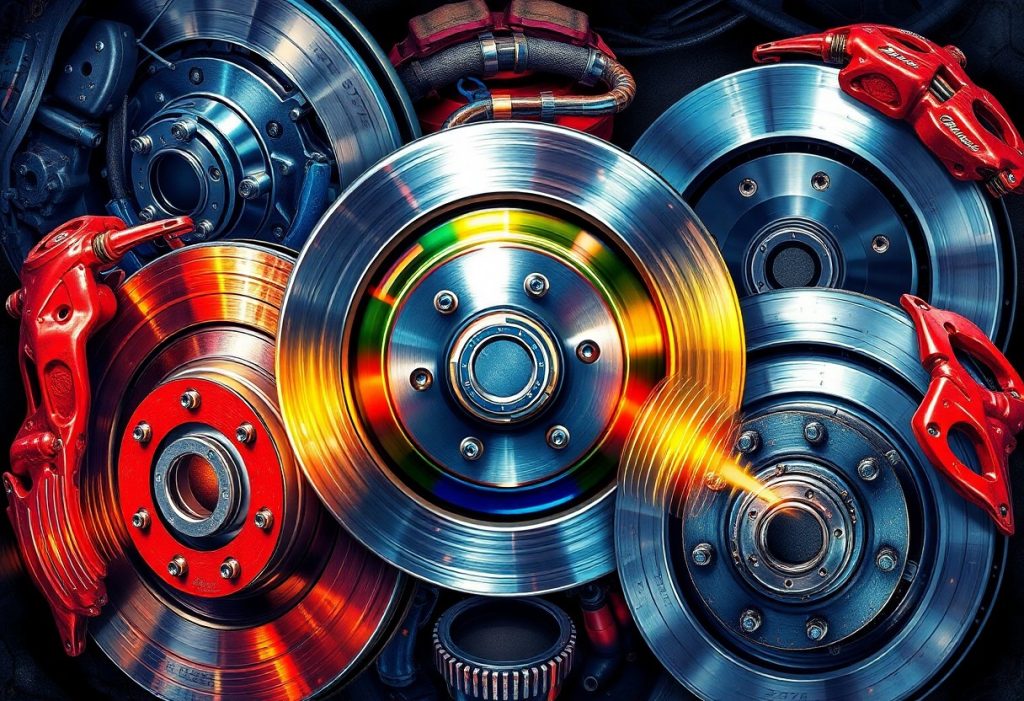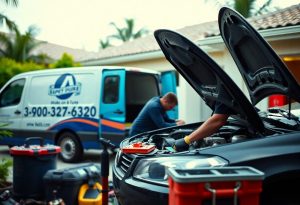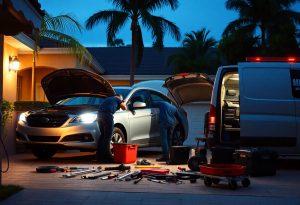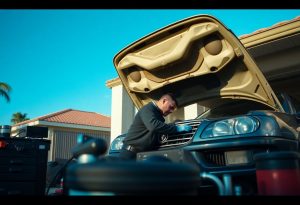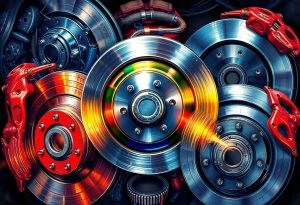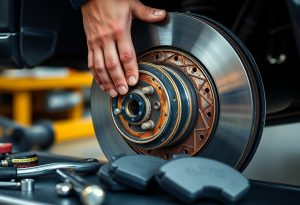Brake sounds can be an alarming indicator of potential issues in your vehicle’s braking system. If you hear any unusual noises, your safety could be at stake, and it’s vital to act swiftly. Understanding these sounds not only helps protect you and others on the road but also aids in maintaining the longevity of your car. In this article, we’ll explore the top ten brake system sounds you should never ignore, what they might mean, and why addressing them promptly can help keep your vehicle in peak condition.
Key Takeaways:
- Squealing or Screeching noises may indicate worn-out brake pads, which can lead to further damage if ignored.
- Grinding or Growling sounds can signal worn-out brake rotors or drums, requiring immediate attention to prevent expensive repairs.
- Clicking or Clunking noises might be a sign of loose or broken brake hardware, which can compromise braking performance.
- Squeaking or Whining sounds when applying the brakes may indicate air in the brake system or low brake fluid levels.
- Rattling or Clattering noises can be a sign of worn-out or broken brake components, such as brake springs or retainers.
— The Sounds of Safety: Top 10 Brake System Noises That Signal It’s Time for Repairs As car owners, we’re accustomed to the familiar hum of our vehicle’s engine, the gentle whoosh of the air conditioning, and the occasional beep of the navigation system. But what about the unusual sounds that can signal trouble? With respect to brake system noises, it’s vital to pay attention to these audible warnings to ensure your safety on the road. The brake system is a critical component of your vehicle, and ignoring unusual sounds can lead to costly repairs, compromised braking performance, and even accidents. In this article, we’ll examine into the top 10 brake system sounds that signal it’s time for repairs, providing you with expert insights, real-world examples, and actionable advice to identify and resolve brake system issues. 1. Squealing or Screeching A high-pitched squealing or screeching noise when applying the brakes is often a sign of worn-out brake pads. As the pads wear down, the metal wear indicator makes contact with the brake rotor, producing this ear-piercing sound. If ignored, worn-out brake pads can lead to further damage, such as scored brake rotors or drums, which can be expensive to replace. Expert Tip: Inspect your brake pads every 12,000 to 15,000 miles, and replace them when they reach the minimum thickness recommended by the manufacturer. 2. Grinding or Growling A grinding or growling noise when braking can indicate worn-out brake rotors or drums. As the brake pads wear down, they can score the rotors or drums, causing this rough, grinding sound. Ignoring this noise can lead to further damage, requiring expensive repairs or even replacement of the entire brake system. Real-World Example: A driver ignored the grinding noise when braking, thinking it was just a minor issue. However, the noise persisted, and eventually, the brake rotor became so damaged that it needed to be replaced, costing the driver over $500. 3. Clicking or Clunking A clicking or clunking noise when applying the brakes might be a sign of loose or broken brake hardware, such as a worn-out brake spring or retainer. This noise can be a sign of a more serious issue, as loose or broken hardware can compromise braking performance and lead to accidents. Actionable Advice: If you notice a clicking or clunking noise, have your brake system inspected by a professional mechanic as soon as possible to identify and address the root cause. 4. Squeaking or Whining A squeaking or whining noise when applying the brakes may indicate air in the brake system or low brake fluid levels. Air in the brake system can cause the brake pads to vibrate, producing this high-pitched sound. Low brake fluid levels can also lead to this noise, as the brake system struggles to function properly. Expert Tip: Check your brake fluid levels regularly, and top them off as needed. Bleed your brake system annually to remove any air that may have entered the system. 5. Rattling or Clattering A rattling or clattering noise when driving can be a sign of worn-out or broken brake components, such as brake springs or retainers. This noise can be a sign of a more serious issue, as loose or broken hardware can compromise braking performance and lead to accidents. Real-World Example: A driver noticed a rattling noise when driving, but ignored it, thinking it was just a minor issue. However, the noise persisted, and eventually, the brake spring broke, causing the brake pedal to become spongy and unreliable. 6. Whirring or Humming A whirring or humming noise when driving can indicate a faulty brake wheel bearing or hub assembly. This noise can be a sign of a more serious issue, as a faulty bearing or hub assembly can cause the brake rotor or drum to vibrate, leading to uneven braking performance. Actionable Advice: If you notice a whirring or humming noise, have your brake system inspected by a professional mechanic as soon as possible to identify and address the root cause. 7. Thudding or Banging A thudding or banging noise when braking can indicate a warped brake rotor or drum. As the brake pads make contact with the warped surface, it produces this loud, thudding sound. Ignoring this noise can lead to further damage, requiring expensive repairs or even replacement of the entire brake system. Expert Tip: Inspect your brake rotors or drums regularly, and have them resurfaced or replaced if they become warped or damaged. 8. Scraping or Rubbing A scraping or rubbing noise when braking can indicate a misaligned brake caliper or brake pad. As the brake pad makes contact with the brake rotor or drum, it produces this scraping or rubbing sound. Ignoring this noise can lead to further damage, requiring expensive repairs or even replacement of the entire brake system. Real-World Example: A driver ignored the scraping noise when braking, thinking it was just a minor issue. However, the noise persisted, and eventually, the brake pad became so worn out that it needed to be replaced, costing the driver over $200. 9. Clanking or Clattering A clanking or clattering noise when driving can indicate loose or broken brake hardware, such as a worn-out brake spring or retainer. This noise can be a sign of a more serious issue, as loose or broken hardware can compromise braking performance and lead to accidents. Actionable Advice: If you notice a clanking or clattering noise, have your brake system inspected by a professional mechanic as soon as possible to identify and address the root cause. 10. Silence Finally, a lack of noise when braking can be just as concerning as unusual sounds. If your brake system is functioning properly, you should hear a gentle whooshing or hissing sound when applying the brakes. A complete lack of noise can indicate a faulty brake pad wear sensor or a malfunctioning brake system. Expert Tip: If you notice an unusual silence when braking, have your brake system inspected by a professional mechanic as soon as possible to identify and address any potential issues. As a final point, unusual brake system sounds can be a warning sign of potential problems that require prompt attention. By understanding these sounds and taking action to address them, you can ensure your safety on the road, prevent costly repairs, and maintain the overall health of your vehicle. Bear in mind, a well-maintained brake system is crucial for safe driving, so don’t ignore those unusual sounds – listen to your car and take action today!
Grinding or Screeching Noise
The grinding or screeching noise you hear when you press the brake pedal is a clear indication that something is amiss with your brake system. This sound is often a warning sign that your brakes need attention, and ignoring it can lead to more severe problems down the road.
When you hear a grinding or screeching noise, it’s important to have your brakes inspected as soon as possible. Delaying repairs can result in increased stopping distances, reduced braking power, and even accidents. By addressing the issue promptly, you can avoid more costly repairs and ensure your safety on the road.
Worn-out Brake Pads
Assuming you’ve been ignoring that grinding noise for a while, it’s likely that your brake pads have worn down significantly. Over time, the brake pads wear down, causing the metal wear indicators to rub against the brake rotor, resulting in the grinding or screeching sound. Worn-out brake pads can lead to reduced braking performance, increased heat buildup, and even damage to other brake components.
When you replace your brake pads, make sure to choose high-quality ones that meet your vehicle’s specifications. It’s also important to have your brake rotors inspected and resurfaced or replaced if necessary to ensure proper braking performance.
Metal-to-Metal Contact Warning
You might hear a grinding or screeching noise when the brake pads have worn down completely, and the metal brake pad wear indicators or even the brake caliper piston are rubbing against the brake rotor. This sound is a warning sign that you’re running out of time to address the issue before serious damage occurs.
For instance, if you continue to drive with metal-to-metal contact, you risk scoring the brake rotor, which can lead to expensive repairs or even replacement. In extreme cases, the brake rotor can warp or crack, causing a loss of braking power and increasing the risk of accidents.

Clicking or Clunking Sound
Assuming you’ve been driving your vehicle and suddenly hear a clicking or clunking noise when you apply the brakes, it’s time to pay close attention. These sounds can often signal underlying issues that need your immediate attention. They may indicate that something isn’t functioning correctly within your brake system, which could compromise not only your vehicle’s performance but also your personal safety while on the road. Understanding and acting on these noises is an important part of responsible vehicle maintenance.
Loose or Worn-out Brake Hardware
An unsettling clicking or clunking sound may be attributed to loose or worn-out brake hardware. This hardware includes components such as caliper bolts, brackets, or even the shims that hold your brake pads in place. When these components loosen or wear out over time, they can shift position, resulting in that jarring sound. Without addressing this issue, you risk further damage to your braking system, which may lead to more expensive repairs or a failure in brake performance when you need it most.
Brake Pad Movement Indication
Now, if the clicking or clunking noise is more related to the brake pads themselves, it could be a sign of their movement within the caliper. As the pads wear down, they may not fit snugly against the rotor anymore, leading to slight shifts and resultant noises. This shifting can be exacerbated if your brake pads are particularly worn or if you’re using low-quality replacements. Listening closely can help you pinpoint if the sound is stemming from the pads rather than other hardware components, which will guide your next steps for repair.
Brake pads that are shifting or moving can be a serious matter. If you notice this sound, it’s a clear indicator that you should check your brake components sooner rather than later. Continuing to drive with this issue could lead to uneven wear on your rotors or even a complete brake failure at the very worst. Ensure you have a trusted technician examine your braking system to identify whether it’s just a simple adjustment or if it’s time for a full replacement of your brake pads to maintain safe driving conditions.
Squealing or Whining Noise
Unlike other sounds that your car may produce during its operation, the squealing or whining noise when you apply the brakes is often a clear signal that something is amiss. This type of sound typically arises when your brake pads start to wear down, reaching a point where the metal backing plate rubs against the brake rotor. It’s designed to alert you that it’s time for a replacement. If you ignore this sound, you may not only compromise braking performance but could also end up damaging your rotors, leading to more costly repairs down the line.
Additionally, squeaking can occur if there are contaminants such as dirt or moisture interfering with the brake pads. You may also hear this noise if the brake components are not adequately lubricated. Addressing the source of the noise promptly is imperative for maintaining optimal braking efficiency and your vehicle’s safety. Delaying repairs can escalate into serious problems, including brake failure or reduced stopping power, which directly jeopardizes your safety on the road.
Warped Brake Rotor
Brake rotors may warp due to heat from excessive braking or uneven wear, manifesting as a noticeable pulsating sensation in the brake pedal when you step on it. This warped condition can create vibrations that can affect your vehicle’s braking ability, reducing your control during sudden stops. If left unaddressed, warped rotors can lead to significant braking issues, not to mention potential hazards if you face an emergency stop.
Timely repair ensures your braking system functions smoothly and efficiently. During routine maintenance, having your mechanic inspect your rotors can catch potential warping issues early, allowing you to avoid the pitfalls of less effective braking performance.
Brake Pad Vibration Indication
Indication of brake pad vibration often comes in the form of an unsettling feeling through your steering wheel or brake pedal when you apply pressure. This vibration typically points toward issues such as worn-out brake pads or problems with the brake slider pins. If you sense this vibration, it’s imperative to engage with your mechanic to diagnose the issue further. Addressing brake pad vibrations promptly helps to ensure your braking efficiency is restored and keeps you safe on the road.
Plus, paying attention to brake pad vibrations can assist you in identifying additional underlying problems, such as misalignment or unevenly worn components. By staying proactive about these signs, you can save yourself from extensive repairs later. Take the time to inspect your brake system regularly and maintain open communication with your mechanic. Your safety is paramount, and keeping your brakes in top condition not only protects your investment in your vehicle but also your life and the lives of others on the road.
Rattling or Clattering Noise
Noticing a rattling or clattering noise from your brake system can be unsettling, but it’s a common sign of potential issues that shouldn’t be ignored. These sounds often indicate that your vehicle’s brake components may not be secured properly. They could arise from various sources, such as loose hardware, worn-out clips, or even degraded rubber bushings. This noise is not just an annoyance; it’s a red flag that demands your attention to ensure your brakes function effectively. Addressing these issues promptly not only enhances your safety but also contributes to the longevity of your brake system.
Loose Brake Components
Components like brake calipers, brackets, and bolts play a vital role in the braking system’s overall stability. If these brake components become loose over time, it can lead to inconsistent braking performance and create vibrations that may compromise your control while driving. Addressing loose components can prevent further damage and more expensive repairs down the road. It’s advisable to have a qualified technician examine your braking system if you hear these unusual sounds.
Brake Pad Wear Sensor Indication
Now, it’s important to consider the role of the brake pad wear sensor. Many modern vehicles are equipped with these sensors, which provide a vital alert when your brake pads are wearing down to a critical level. If you hear a metal grinding noise along with a warning light on your dashboard, this is a clear indication that the brake pads need immediate replacement. Ignoring this warning could lead to deterioration of your rotors, resulting in costly repairs and, more importantly, a significant compromise on your safety.
With proper attention to brake pad wear indications, you can prevent further damage to your braking system. It’s beneficial to routinely check your brake pads for wear and ensure that the sensors are functioning correctly. If you find that your brake pads are too thin, it’s imperative to replace them immediately. By doing so, you not only extend the life of your brake rotors but also ensure that your braking system operates at its best when you need it most. Prioritizing these maintenance tasks can lead to a safer and more reliable driving experience.
Whirring or Humming Noise
To many car owners, a whirring or humming noise from the brake system can be a mystifying and unsettling experience. However, it’s necessary to recognize that this sound is often a warning sign that something is amiss and requires attention. When you hear a whirring or humming noise, it’s likely related to one of two possible issues: worn-out brake bearings or brake component wear indication.
A whirring or humming noise can be a subtle yet persistent warning that your brake system needs attention. Ignoring this sound can lead to more severe problems down the road, including reduced stopping power and increased risk of accidents. By addressing the underlying cause of the noise, you can ensure your safety on the road and avoid costly repairs.
Worn-out brake bearings
Even the most well-maintained vehicles can experience worn-out brake bearings, which can cause a whirring or humming noise. Over time, the bearings can wear down, leading to excessive heat buildup and friction. This can result in a loud, high-pitched whine or grinding noise that’s often accompanied by a spongy brake pedal feel.
If you suspect worn-out brake bearings are causing the noise, it’s necessary to have them inspected and replaced as soon as possible. Neglecting to do so can lead to premature brake rotor wear, increased stopping distances, and even brake failure.
Brake component wear indication
Humming or whirring noises can also be indicative of wear on brake components, such as the brake pads or rotors. As these components wear down, they can cause vibrations that result in a humming or whirring sound.
Whirring noises can be particularly concerning, as they may indicate excessive wear on the brake rotors, which can lead to uneven braking and reduced stopping power. By addressing brake component wear promptly, you can prevent more severe problems from developing and ensure your vehicle remains safe to drive.
In the case of brake component wear indication, it’s necessary to have your brakes inspected by a qualified mechanic. They can assess the condition of your brake pads, rotors, and other components, providing recommendations for repair or replacement as needed. By staying proactive, you can avoid costly repairs, reduce downtime, and ensure your safety on the road.
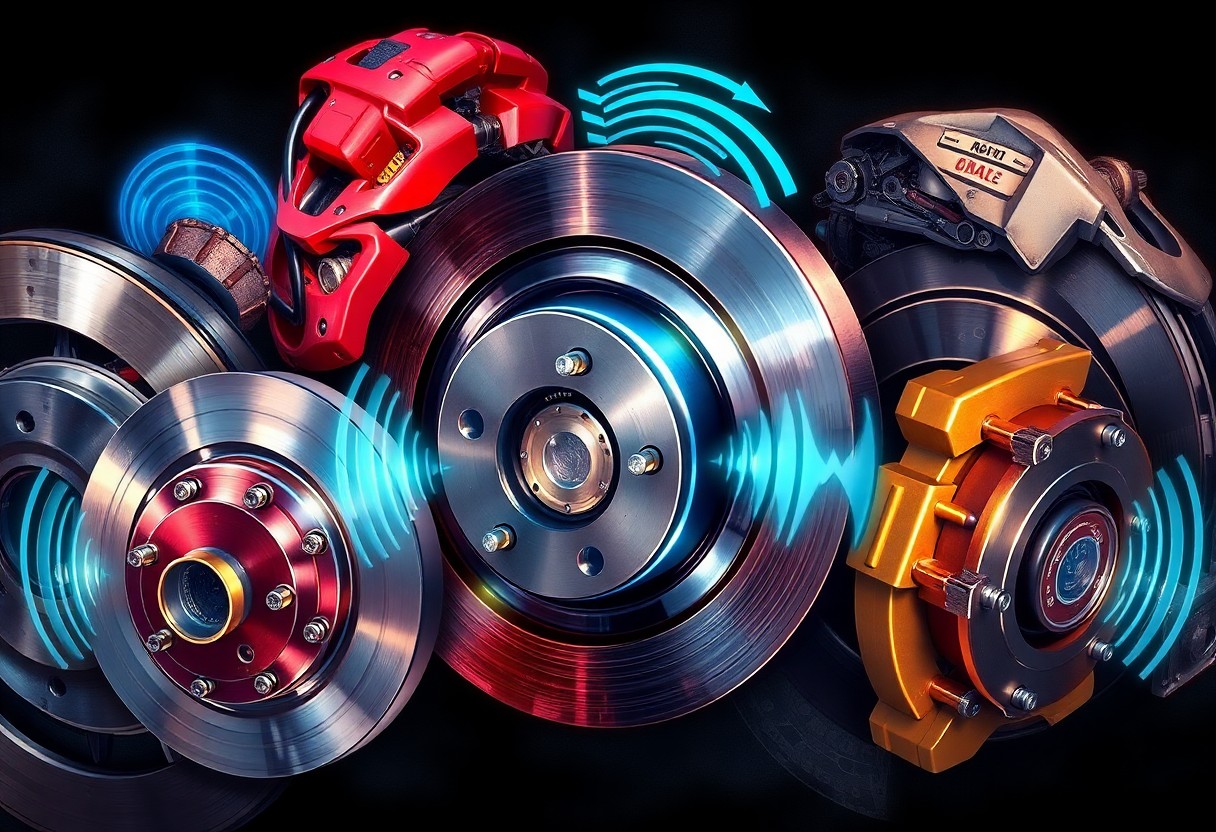
Scraping or Rubbing Noise
To the untrained ear, a scraping or rubbing noise from your brakes may seem like merely an inconvenience, but it signals a need for immediate attention. This sound often emerges when your brake pads have worn down excessively, leading to metal-on-metal contact between the brake pad backing plate and the brake rotor. This scenario not only compromises your vehicle’s braking efficiency but can also lead to further damage in your brake system. If you hear this sound, it is imperative to investigate the issue promptly to prevent more extensive repairs down the line.
Brake Pad Wear Indication
Indication of worn brake pads is one of the most common reasons you might experience that scraping sound. When your brake pads reach a certain level of wear, the built-in squealer – a small metal tab – comes into contact with the rotor, producing a distinctive sound that signals the need for replacement. This sound serves as an early warning, helping you avoid the more significant expenses associated with damage to your rotors and other brake components. If you allow this wear to continue unchecked, you risk not only decreased stopping power but also potentially unsafe driving conditions.
Brake Rotor Scoring Prevention
On the flip side of excessive brake pad wear, failing to address the scraping noise can lead directly to brake rotor scoring. When the rotors suffer from deep grooves and scratches due to prolonged metal-on-metal contact, it can lead to poor braking performance and increased vehicle vibrations. Scoring indicates that not only do your brake pads need to be replaced, but your rotors may require resurfacing or replacement as well. Investing in timely rotor maintenance can significantly prolong the life of your entire brake system.
Noise is not merely a nuisance; it can be a significant indicator of underlying issues that could affect your vehicle’s safety. If you are experiencing scraping or rubbing noises, it is wise to schedule a professional brake inspection at your earliest convenience. By addressing these sounds promptly, you can not only save money on repair costs but also enhance your driving comfort and safety. Always prioritize the health of your brake system, as it is fundamental to your vehicle’s overall performance.
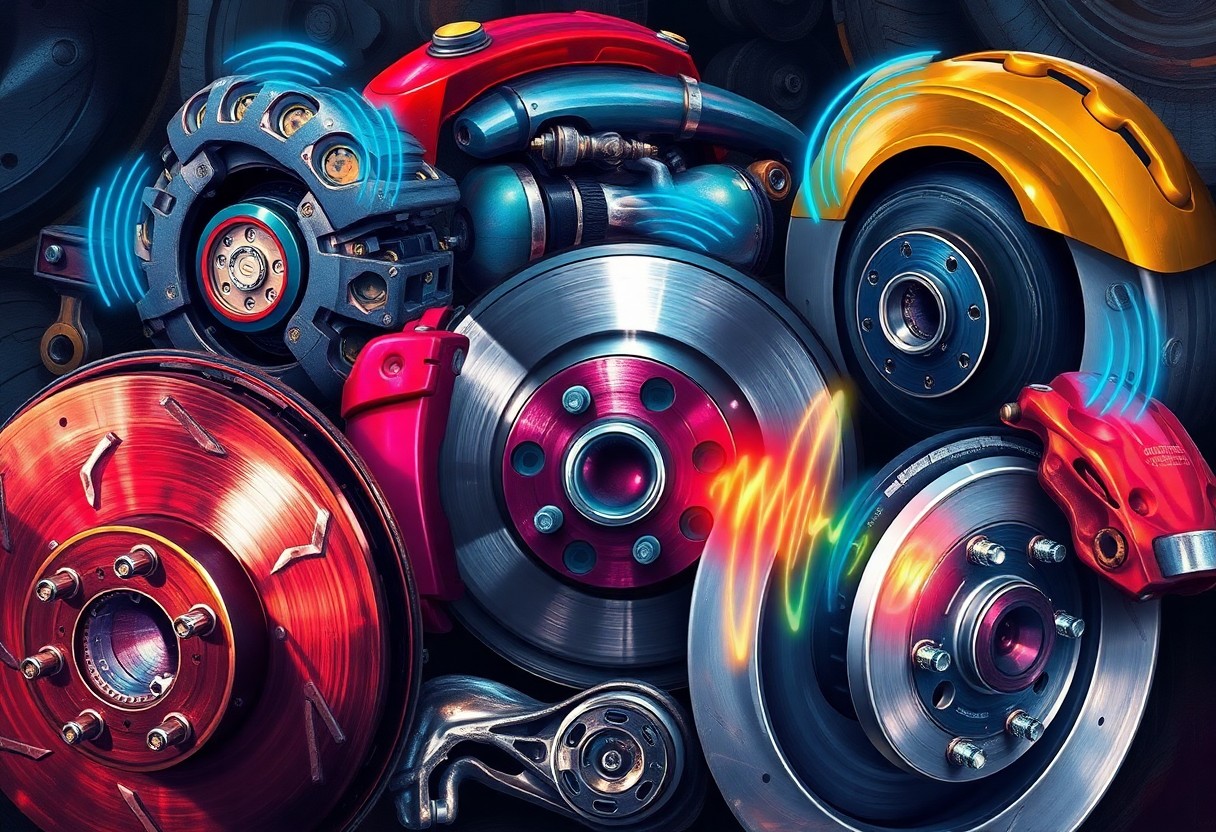
Spongy Brake Pedal
Despite the seemingly innocuous feeling of a spongy brake pedal, it signals that your vehicle’s braking system requires immediate attention. When you press down on the pedal and it feels soft or sinks to the floor with little resistance, it can be alarming. This unusual sensation often indicates a problem with your brake system that can compromise your ability to stop effectively, posing significant safety risks on the road. You’re not just feeling a lack of response; that squishy feeling could lead to brake failure if left unchecked.
Air in Brake System
Some factors can lead to air bubbles entering your brake lines, which can result in that soft or spongy sensation when you apply the brakes. Air can seep into the brake system through various means, including a maintenance mishap or corrosion in the brake lines. When air occupies the space in the brake lines that should be filled with hydraulic fluid, it disrupts the pressure needed for quick and effective braking. If you notice this sound alongside the spongy pedal, it’s a clear indicator that something is amiss with your brake fluid’s integrity.
Brake Fluid Leak Indication
With a spongy brake pedal, you should also consider the possibility of a brake fluid leak. Any signs of fluid pooling under your vehicle or around the brake components can indicate a serious issue. A brake fluid leak can significantly compromise your braking ability by reducing the pressure in the brake lines, leading to decreased responsiveness when you attempt to stop. The importance of addressing this issue cannot be overstated, as driving with insufficient brake fluid puts you and others on the road at risk.
Brake fluid leaks not only diminish the performance of your brakes but can also lead to more extensive damage if not resolved swiftly. Inspect your brake lines regularly for any signs of wear, and if you notice any wetness or a puddle beneath your vehicle, it’s necessary to investigate further. Taking timely action could prevent a potentially dangerous situation and ensure that your vehicle remains safe and reliable for your driving needs. If you’re uncertain about what to do, seeking professional help is always a wise choice to maintain your vehicle’s brake system integrity.
Low Grinding Noise
After hearing a low grinding noise when you apply the brakes, your heart might drop— and it should. This sound is often a harbinger of serious brake issues, frequently indicating that the brake pads have worn down significantly and that the metal backing is now making contact with the rotor. This is a situation that not only compromises your vehicle’s safety but can also lead to expensive repairs if addressed too late. You can learn more about the signs that your brakes need attention in this Top 10 Signs Your Car Needs Brake Repair in Corona, CA.
It is crucial to take immediate action when you hear this sound. Ignoring a grinding noise will not only impact braking efficiency but could also cause damage to the rotors, potentially leading to a full-scale brake replacement. To ensure your safety, make it a priority to have your vehicle examined by a professional who can assess the extent of the wear and recommend appropriate measures.
Brake Pad Wear on One Side
Side wear on your brake pads can be indicative of a problem that extends beyond just simple wear and tear. If you notice that one side of your brakes is more worn than the other, this disparity could be a signal that your brake caliper is malfunctioning or that there might be an issue with the brake hardware. Your car’s braking system relies on even pressure across all pads, and any unevenness can diminish your stopping power, creating a safety concern.
Uneven Brake Wear Indication
With uneven brake wear, you might experience subtle hints such as your car pulling to one side when braking. This is often due to one brake pad being more worn down than its counterpart, leading to different levels of friction during deceleration. Besides affecting performance, this can contribute to additional complications, like premature rotor wear or even disc warping. Recognizing these warning signs early can save you from more severe issues in the long run.
Plus, addressing uneven wear can help improve your overall driving experience. It’s in your best interest to have your braking system inspected and repaired by professionals who can ensure that all components are functioning optimally. This proactive approach not only enhances safety but can also lead to better fuel efficiency and less stress on your vehicle, ultimately saving you money in the long term.
High-Pitched Whine
Many car owners have experienced a high-pitched whine when applying the brakes, but what does it mean? A high-pitched whine can be an indication of worn-out brake components or air in the brake system. If you’re hearing this sound, it’s necessary to have your brakes inspected as soon as possible. As mentioned in 10 Signs Your Car’s Brake System Needs Attention, unusual sounds can be a warning sign that your brake system needs attention.
A high-pitched whine can be particularly concerning because it may indicate a more serious issue with your brake system. If you’re experiencing this sound, don’t hesitate to have your brakes checked by a professional mechanic. Ignoring this sound can lead to more severe problems down the road, putting your safety and the safety of others at risk.
Worn-out brake piston
High-pitched squealing or whining sounds can often be attributed to a worn-out brake piston. When the piston is worn out, it can cause the brake pads to vibrate, resulting in the high-pitched noise. This is a common issue, especially if you’ve been driving in heavy traffic or hauling heavy loads. If you’re hearing this sound, it’s likely that your brake piston needs to be replaced or rebuilt.
Don’t ignore this sound, as a worn-out brake piston can lead to reduced braking performance and increased stopping distances. If you’re experiencing a high-pitched whine, have your brake system inspected by a professional mechanic to determine the cause and recommend the necessary repairs.
Brake component wear indication
Brake components, such as brake pads and rotors, can also cause a high-pitched whine when they’re worn out. As these components wear down, they can vibrate and produce a high-pitched noise. This sound is often more noticeable when you’re applying gentle pressure to the brake pedal.
This sound is particularly concerning because it can indicate that your brake pads are worn down to the point where they’re no longer providing adequate braking performance. If you’re hearing this sound, it’s necessary to have your brake pads inspected and replaced if necessary.
For instance, if you’re driving in heavy traffic and you notice a high-pitched whine when applying the brakes, it may be a sign that your brake pads are worn out. Don’t wait until it’s too late; have your brakes inspected and repaired promptly to ensure your safety on the road.
Final Words
Drawing together the various sounds your brake system might emit is crucial for ensuring your and your vehicle’s safety. Recognizing these auditory signals—whether it’s a high-pitched squeal, a grinding noise, or a soft hissing—allows you to take timely action. By understanding what these sounds might indicate about your brakes, you’re not just averting potential repair costs; you’re embracing a proactive approach to vehicle maintenance. Your brakes play a vital role in your overall driving experience, and responding to their needs is a fundamental aspect of responsible car ownership.
Addressing the issues that arise from these ten warning sounds is not only about enhancing your vehicle’s performance; it’s about safeguarding yourself and others on the road. By keeping an ear out for these noises and acting swiftly when you hear them, you can ensure that your brake system remains in optimal condition. Stay attentive and maintain a close relationship with your brake health—after all, your vehicle’s reliability and your safety depend on it.
Top 10 Brake System Sounds That Signal It’s Time for Repairs As a car owner, you’re likely familiar with the usual hum of your vehicle’s engine and the occasional beep of the horn. But what about the unusual sounds that can signal a problem with your brake system? Ignoring these sounds can lead to serious safety issues, accidents, and costly repairs down the line. In this article, we’ll explore the top 10 brake system sounds that indicate it’s time for repairs, providing you with the knowledge and expertise to stay safe on the road. 1. Squealing or Screeching Noise When you press the brake pedal, a high-pitched squealing or screeching noise can be a sign of worn-out brake pads. As the pads wear down, the metal wear indicator comes into contact with the brake rotor, producing this ear-piercing sound. If left unchecked, the brake pads can wear down to the metal, causing damage to the rotor and leading to a more expensive repair. Expert Tip: Replace your brake pads every 30,000 to 50,000 miles, depending on your driving habits and the manufacturer’s recommendations. 2. Grinding or Growling Noise A grinding or growling noise when braking can indicate that the brake pads have worn down completely, and the metal is now making contact with the rotor. This sound is often accompanied by a vibration in the pedal or steering wheel. If you hear this noise, it’s imperative to address it promptly to avoid further damage to your brake system. Real-World Example: A driver in stop-and-go traffic may not notice the gradual wear of their brake pads until they hear a grinding noise when braking. By addressing the issue early, they can avoid a costly repair bill and ensure their safety on the road. 3. Clicking or Clunking Noise A clicking or clunking noise when applying the brakes can indicate a problem with the brake caliper or brake hardware. This sound is often caused by loose or worn-out components, which can lead to uneven brake pad wear and reduced stopping power. Actionable Advice: Inspect your brake caliper and hardware regularly to ensure they’re securely fastened and free from corrosion. 4. Whining or Whirring Noise A whining or whirring noise when braking can be a sign of a faulty brake booster or master cylinder. These components are responsible for amplifying the pressure you apply to the brake pedal, so any issues can lead to a spongy or soft brake pedal. Expert Insight: If you notice a whining or whirring noise, have your brake system inspected by a professional mechanic to diagnose the root cause of the issue. 5. Rattling or Clattering Noise A rattling or clattering noise when driving can indicate loose or broken brake components, such as a worn-out brake pad retaining clip or a broken brake dust shield. While this sound may not seem critical, it can lead to more severe problems if left unchecked. Practical Tip: Regularly inspect your brake system to identify and address any loose or broken components before they cause further damage. 6. Hissing or Air Leaking Noise A hissing or air leaking noise when braking can indicate a problem with the brake master cylinder or brake lines. Air in the brake system can lead to a spongy brake pedal and reduced stopping power. Real-World Example: A driver who notices a hissing noise when braking may need to bleed their brake system to remove air and restore proper brake function. 7. Scraping or Rubbing Noise A scraping or rubbing noise when braking can indicate that the brake pads are not properly seated or are misaligned. This sound can also be caused by a warped brake rotor or brake drum. Actionable Advice: Inspect your brake pads and rotors regularly to ensure they’re properly seated and aligned. 8. Pulsating or Vibration Noise A pulsating or vibration noise when braking can indicate a warped brake rotor or brake drum. This sound can also be caused by uneven brake pad wear or a misaligned brake caliper. Expert Insight: If you notice a pulsating or vibration noise, have your brake rotors or drums inspected and resurfaced or replaced if necessary. 9. Squeaking or Chirping Noise A squeaking or chirping noise when braking can indicate a problem with the brake pad wear sensors. These sensors are designed to alert you when the brake pads need to be replaced, but they can malfunction and produce a squeaking or chirping noise. Practical Tip: Consult your vehicle’s owner’s manual to learn how to reset the brake pad wear sensors and eliminate the noise. 10. Silence Finally, the absence of any noise when braking can be a sign of a problem with the brake system. If your brake pads are worn down completely, you may not hear any noise when applying the brakes. This silence can be deceiving, as it may indicate a more severe problem with your brake system. Expert Tip: Regularly inspect your brake system to identify and address any issues before they lead to a silent but deadly brake failure. FAQ
Q: What’s the most common brake system sound that signals it’s time for repairs?
A: The most common brake system sound that signals it’s time for repairs is a squealing or screeching noise, which indicates worn-out brake pads.
Q: Can I drive my car if I hear a grinding noise when braking?
A: No, it’s not recommended to drive your car if you hear a grinding noise when braking. This sound indicates that the brake pads have worn down completely, and driving can cause further damage to your brake system.
Q: How often should I inspect my brake system?
A: You should inspect your brake system every 12,000 to 15,000 miles, or as recommended by your vehicle’s manufacturer.
Q: Can I repair my brake system myself?
A: While it’s possible to repair your brake system yourself, it’s recommended to have a professional mechanic inspect and repair your brake system to ensure your safety on the road.
Q: What’s the most expensive brake system repair?
A: The most expensive brake system repair is often replacing the brake master cylinder or brake booster, which can cost upwards of $1,000 or more, depending on the make and model of your vehicle.
By being aware of these top 10 brake system sounds, you can identify and address potential issues before they lead to accidents, injuries, or costly repairs. Remember to stay vigilant, inspect your brake system regularly, and seek professional help when needed to ensure your safety on the road.
